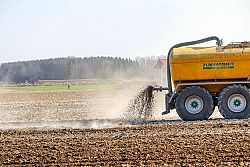

An environmental campaign group Fighting Dirty is taking legal action against the Department for the Environment, Food and Rural Affairs (DEFRA) and the Environment Agency for abandoning their commitment to legislate changes on the use of sewage sludge on farmland.
Treated sewage sludge is routinely sold by water companies to farmers who use it as a land fertiliser for spreading. However, as a product of sewage treatment works, such waste may contain a number of hazardous substances and can cause severe pollution of soil and watercourses with microplastics, as well as large amounts of persistent organic pollutants (POPs). Researches from Cardiff and Manchester found that the UK may have some of the highest concentrations of microplastics in the soil in the world, where between 500 and 1000 pieces of microplastic are found per square metre of farmland.
In 2020, the Environment Agency published a strategy which aimed to review the legislation on the use of sludge in agriculture, with the Environment Agency saying that the current legislation is no longer a usable regulatory framework, where the rules have not changed since 1989, to ensure they are fit for purpose and include improved testing and regulation of sludge in the environmental permitting regime.
Originally, the strategy aimed to bring a new regulatory framework in mid-2023, but the recent updates to the policy paper, which took place in August 2023, removed the timelines for implementing the strategy, without any timescale for further action announced.
Fighting Dirty campaigner, Georgia Elliott-Smith said: Farmers are unknowingly being sold potentially highly toxic material to spread on their land, poisoning our soil, watercourses and food, and we have no hope of a date when this situation will be resolved.
"It is unacceptable to be left in limbo like this."
A spokesperson for the Environment Agency said: "As the responsible regulator in England for the supply, treatment, storage and use of sludge, the purpose of our strategy is to enable its safe and sustainable use on land. This ensures water companies meet their environmental obligations while contributing to clean and plentiful water and soil that is healthy and productive."
For more information on this subject, see: